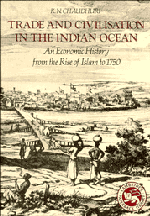Book contents
- Frontmatter
- Contents
- List of maps
- List of plates
- Preface
- Abbreviations
- Introduction
- Part I General problems and historical events
- Part II Structure and la longue durée
- 6 The sea and its mastery
- 7 Ships and shipbuilding in the Indian Ocean
- 8 The land and its relationship with long-distance trade
- 9 Commodities and markets
- 10 Capital and trade in the Indian Ocean: the problem of scale, merchants, money, and production
- 11 Conclusion
- Notes
- Glossary
- Guide to sources and further reading
- Bibliography
- Index
6 - The sea and its mastery
Published online by Cambridge University Press: 05 August 2014
- Frontmatter
- Contents
- List of maps
- List of plates
- Preface
- Abbreviations
- Introduction
- Part I General problems and historical events
- Part II Structure and la longue durée
- 6 The sea and its mastery
- 7 Ships and shipbuilding in the Indian Ocean
- 8 The land and its relationship with long-distance trade
- 9 Commodities and markets
- 10 Capital and trade in the Indian Ocean: the problem of scale, merchants, money, and production
- 11 Conclusion
- Notes
- Glossary
- Guide to sources and further reading
- Bibliography
- Index
Summary
The attitudes and ideas of pre-modern people towards the sea are still relatively unexplored by historians. There are few direct sources that can be drawn upon to illustrate what people actually thought about the role that the sea played in their daily lives. This role was likely to vary according to historical divisions of labour and social stratifications among communities bordering the Indian Ocean. A group instantly recognisable in every society was the one that lived off the sea: fishermen, coral-divers, boatbuilders, rope-makers, net-menders, and so on. Their contact with the sea began in early childhood and continued through the hard toils of an entire lifetime. Such people were to be found everywhere in the Indian Ocean: in Muscat and Bahrayn, among the marshes around Basra, all along the coast of India, in Indonesia and South China. These were the original boat people, who found in the sea their daily sustenance. Often their relationship with the people of dry land was uneasy and marked by suspicion. In the Malay—Indonesian seas, for example, the Buginese community of Celebes manning fast-moving praus was feared universally as consisting of the most formidable sea-fighters in the area. There were similar seafaring communities, with a reputation of piracy, on the western coast of India. Ahmad Ibn Majid, a much-read Arab navigator of the fifteenth century, warned in his treatise that captains of vessels leaving the roadstead of Calicut should beware of a people called “al-Kabkuri”, whose boats could lurk along the coconut plantations.
- Type
- Chapter
- Information
- Trade and Civilisation in the Indian OceanAn Economic History from the Rise of Islam to 1750, pp. 121 - 137Publisher: Cambridge University PressPrint publication year: 1985



